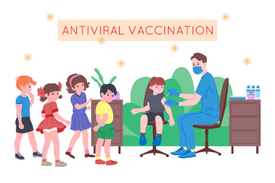
Vaccination helps in protection against infections and diseases. It is necessary for a child to get all the necessary vaccines before they turn 16 to lead a relatively healthier life ahead.
In this blog, we look at four common vaccines for babies and the schedule and recommended dosages.
BCG Vaccine
The bacille Calmette-Guérin (BCG) vaccine is an important vaccine for protection against Tuberculosis (TB) as well as Meningitis. The BCG vaccine is in existence for about eight decades. It has widespread use in several countries, especially in India.
This vaccine is supposed to be given at birth up to one year of age. At birth, a dose of 0.05 ml is given to the baby and after birth a dose of 0.1 ml is given.
Hepatitis B Vaccine
The hepatitis B virus, which can be fatal, causes the potentially fatal liver illness known as hepatitis B. WHO advises that all newborns receive the hepatitis B vaccine as soon as feasible after delivery, preferably within 24 hours.
Two or three doses of the vaccine after the birth should be spaced at least 4 weeks apart to complete the immunisation series. Protection is likely lifetime and lasts for at least 20 years. A dose of 0.5 ml is prescribed at birth.
Oral Polio Vaccine
Poliomyelitis, commonly known as Polio, is another debilitating disease caused by the enterovirus. Protection against Polio requires Oral Polio vaccines. It is also helpful against diphtheria, Hib infections, Tetanus etc.
Doses are recommended at 6, 10 and 14 weeks of age. About 0.5 ml of the vaccine dose is given.
Rotavirus Vaccine
Rotaviruses, which are mostly spread by faeces and the mouth, typically infect children before they become three years old. Rotavirus infections are the main cause of severe diarrhoea in young children, and the rotavirus vaccination guards against them.
This vaccine is given at 6, 10 and 14 weeks of age. In the liquid form, about 5 drops are recommended and the reconstituted vaccine requires 2.5 ml.
